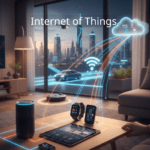Table of Contents
Introduction
Artificial Intelligence (AI) has rapidly evolved from a futuristic concept to a present-day reality, revolutionizing numerous industries. From healthcare to entertainment, AI’s impact is profound and far-reaching. This article delves into ten compelling success stories that illustrate AI’s transformative power, showcasing its potential to change the world for the better.
AI in Healthcare
Revolutionizing Diagnostics
One of AI’s most significant impacts on healthcare is its ability to revolutionize diagnostics. AI-powered tools can analyze medical images with incredible accuracy, often surpassing human capabilities. For instance, Google’s DeepMind has developed an AI system that can detect over 50 eye diseases from retinal scans, enabling early intervention and treatment.
Enhancing Patient Care
Artificial Intelligence also plays a crucial role in enhancing patient care. Virtual health assistants, like Babylon Health’s AI, provide patients with instant medical advice, monitor chronic conditions, and even schedule appointments. This technology not only improves patient outcomes but also alleviates the burden on healthcare professionals.
Artificial Intelligence in Finance
Fraud Detection
In the financial industry, AI is a powerful tool for detecting fraud. Machine learning algorithms can analyze vast amounts of transaction data to identify suspicious patterns and flag potential fraud in real time. For example, PayPal uses AI to detect and prevent fraudulent activities, saving millions of dollars annually.
Algorithmic Trading
AI has also transformed the world of trading through algorithmic trading. These AI-driven systems can analyze market trends, predict price movements, and execute trades at lightning speed. Hedge funds and investment firms leverage AI to gain a competitive edge, maximizing profits while minimizing risks.
Artificial Intelligence in Retail
Personalized Shopping Experiences
Retailers are harnessing AI to create personalized shopping experiences for customers. Amazon’s recommendation engine, powered by AI, suggests products based on browsing history and purchase behavior, significantly boosting sales and customer satisfaction.
Inventory Management
AI is also revolutionizing inventory management. Retail giants like Walmart use AI-driven analytics to predict demand, manage stock levels, and optimize supply chains. This process ensures that products are available when customers need them, reducing waste and increasing efficiency.
Artificial Intelligence in Education
Personalized Learning Plans
In education, AI is paving the way for personalized learning plans. Platforms like Coursera use AI to tailor course recommendations based on individual learning styles and progress. This technology ensures that students receive a customized education that meets their unique needs.
Automating Administrative Tasks
AI is also simplifying administrative tasks in educational institutions. AI-powered chatbots handle routine inquiries, freeing up staff to focus on more critical tasks. Additionally, AI systems can grade assignments and exams, providing instant feedback to students and reducing the workload for educators.
Artificial Intelligence in Transportation
Autonomous Vehicles
The transportation industry is experiencing a significant shift with the advent of autonomous vehicles. Leading companies like Tesla and Waymo are developing self-driving cars that aim to reduce accidents and improve traffic flow. These AI-driven vehicles use sensors and machine learning to navigate roads safely and efficiently.
Traffic Management Systems
AI is also enhancing traffic management systems. Cities like Singapore use AI to monitor traffic patterns and optimize signal timings, reducing congestion and improving overall traffic flow. This process leads to shorter commute times and lower emissions.
Artificial Intelligence in Entertainment
Content Recommendations
AI has transformed the entertainment industry by providing personalized content recommendations. Streaming services like Netflix and Spotify use AI algorithms to analyze user preferences and suggest movies, shows, and music, enhancing the user experience and keeping audiences engaged.
Virtual Reality Experiences
AI is also pushing the boundaries of virtual reality (VR). AI-powered VR systems create immersive experiences that adapt to user interactions in real time. This technology is used in gaming, training simulations, and even virtual tourism, offering users a dynamic and engaging experience.
Artificial Intelligence in Agriculture
Precision Farming
Agriculture is benefiting from AI through precision farming techniques. AI-powered drones and sensors collect data on soil conditions, crop health, and weather patterns. Farmers use this information to make informed decisions, optimize resource usage, and increase crop yields.
Crop Monitoring
AI also aids in crop monitoring. AI systems can detect signs of disease, pest infestations, and nutrient deficiencies early, allowing farmers to take corrective actions promptly. This technology not only improves crop health but also ensures sustainable farming practices.
AI in Customer Service
Chatbots and Virtual Assistants
AI-driven chatbots and virtual assistants have revolutionized customer service. Companies like Zendesk and Salesforce use AI to handle customer inquiries, provide support, and resolve issues quickly. This technology leads to higher customer satisfaction and reduces the workload on human agents.
Enhancing Customer Satisfaction
AI also enhances customer satisfaction by providing personalized interactions. AI systems analyze customer data to tailor responses and offer relevant solutions, creating a more engaging and efficient customer service experience.
AI in Manufacturing
Predictive Maintenance
Manufacturing is experiencing a transformation with AI-powered predictive maintenance. AI systems analyze data from machinery to predict failures before they occur, reducing downtime and maintenance costs. Companies like GE use AI to keep their industrial equipment running smoothly and efficiently.
Quality Control
AI is also improving quality control in manufacturing. AI-powered inspection systems can detect defects in products with high precision, ensuring that only top-quality items reach customers. This process leads to higher customer satisfaction and reduces waste.
AI in Environmental Conservation
Wildlife Monitoring
AI is crucial to wildlife monitoring and conservation efforts. AI-powered cameras and drones track animal movements and monitor habitats, providing valuable data for conservationists. This technology helps protect endangered species and preserve biodiversity.
Climate Change Modeling
AI is also being used to model climate change and predict its impacts. Researchers use AI to analyze vast amounts of climate data, identifying patterns and making forecasts. This information is crucial for developing strategies to mitigate climate change and protect the environment.
Case Studies
Case Study 1: AI in Medical Imaging
AI has significantly improved diagnostic accuracy in medical imaging. For instance, Zebra Medical Vision’s AI software can detect various diseases from medical scans, including fractures, cardiovascular issues, and liver diseases, leading to earlier and more accurate diagnoses.
Case Study 2: AI in Fraud Detection
In finance, AI’s role in fraud detection is exemplified by Mastercard’s success. The company’s AI-driven system analyzes transaction data in real time, identifying and preventing fraudulent activities, thereby protecting customers and reducing financial losses.
Case Study 3: AI in Personalized Education
AI’s impact on personalized education is evident in platforms like DreamBox Learning. This AI-powered math program adapts to each student’s learning pace and style, providing customized lessons that help improve understanding and retention.
Case Study 4: AI in Autonomous Driving
Waymo, a leader in autonomous driving, uses AI to power its self-driving cars. These vehicles navigate complex urban environments, demonstrating the potential of AI to revolutionize transportation by enhancing safety and efficiency.
Case Study 5: AI in Precision Agriculture
John Deere’s AI-powered farming equipment exemplifies AI’s role in precision agriculture. These machines use AI to analyze field data and optimize planting, fertilizing, and harvesting processes, increasing productivity and sustainability.
Conclusion
AI’s transformative power is evident across various industries, from healthcare and finance to entertainment and environmental conservation. These success stories highlight AI’s potential to improve efficiency, enhance customer experiences, and solve complex problems. As AI technology continues to advance, its impact will only grow, paving the way for a more innovative and efficient future.










